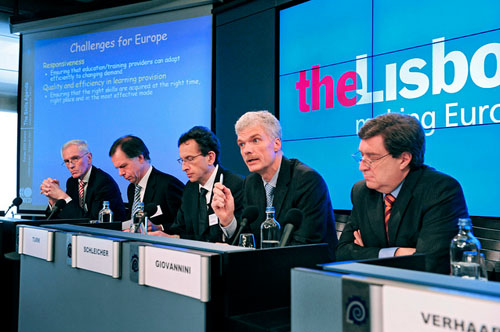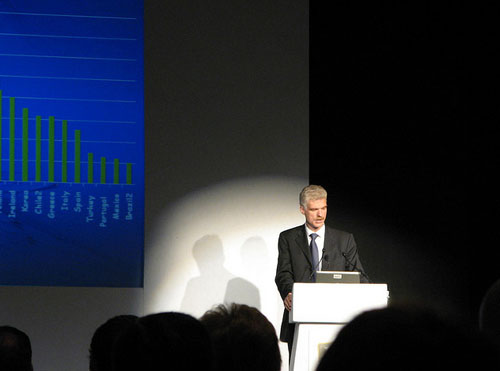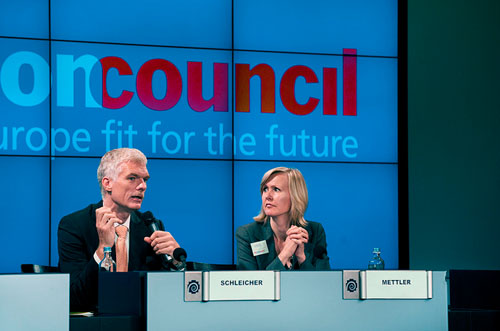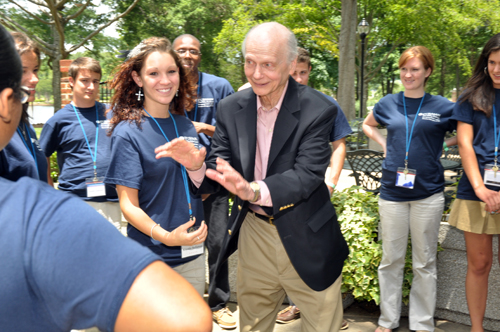
According to Andreas Schleicher of OECD, the United States is unique among countries in that the generation of workers entering the US workforce does not have higher college attainment levels than the generation about to leave the workforce. He further believes a key strategy to addressing this problem is improving equitable access to education across the board and that good examples of how to achieve this can be found in other education systems such as Finland, Καναδάς, Japan or Korea. None of this sounds particularly new, but I wondered if Andreas were making the big picture education decisions, how would he address some of our key issues? We recently had the opportunity to discuss this further.
Andreas Schleicher is Special Advisor on Education Policy to OECD’s Secretary-General, and is Deputy Director for Education. He also provides strategic oversight over OECD’s work on the development and utilization of skills and their social and economic outcomes. This includes the Programme for International Student Assessment (PISA), η έρευνα του ΟΟΣΑ Δεξιοτήτων Ενηλίκων (PIAAC), η διδασκαλία του ΟΟΣΑ και της Διεθνούς Έρευνας Μάθηση (ΑΥΤΑ), και η ανάπτυξη και η ανάλυση των σημείων αναφοράς σχετικά με τις επιδόσεις των εκπαιδευτικών συστημάτων (INES).

Σε περίπτωση που κυβέρνηση παραδίδουν μαθήματα δωρεάν εκπαίδευσης από το νηπιαγωγείο μέχρι το πανεπιστήμιο?
Δεν υπάρχει δωρεάν παιδεία; someone has to pay. If governments provide free education from pre-school through college, they need to back that up with a steeply progressive tax system so that the better qualified people end up paying the bill eventually. The Nordic countries in Europe show that this can work, and work well. The other good option is to ask students to pay tuition and to back that up with a universal student support system that provides an income-contingent loan system complemented with a scheme of means-tested grants. In that way you minimize risks for students, avoid that they end up with huge debt that they cannot pay back, and you provide special assistance to those students who would otherwise be prevented from attending university. The UK shows how this can work. Providing college tuition-free without getting the money back through taxes for the better-educated means that the poor end up subsidizing the education of the rich.
Are you in favor of privatizing public schools?
Results from PISA show no performance advantage of private schools, once you account for social background. Ωστόσο,, cross-country analysis of PISA suggests that the prevalence of schools’ autonomy to define and elaborate their curricula and assessments relates positively to the performance of school systems, even after accounting for national income. School systems that provide schools with greater discretion in deciding student assessment policies, the courses offered, the course content and the textbooks used are also school systems that perform at higher levels. So perhaps the question for countries is not how many private or charter schools they have, but how they enable every public school to assume charter-type responsibility.

Since every child is probably not meant to pursue a liberal arts education, what would you do to make our children more competitive in the skilled trade jobs market?
Our data show that when employers are involved in designing curricula and delivering education programs at the post-secondary level, students seem to have a smoother transition from education into the labor market. Compared to purely government-designed curricula taught in school-based systems, learning in the workplace offers several advantages: it allows trainees to develop “hard” skills on modern equipment, και “soft” δεξιότητες, such as teamwork, communication and negotiation, through real-world experience. Hands-on workplace training can also help to motivate disengaged youth to stay in or re-engage with the education system. Workplace training also facilitates recruitment by allowing employers and potential employees to get to know each other, while trainees contribute to the output of the training firm. Workplace learning opportunities are also a direct expression of employers’ ανάγκες, as employers will be ready to offer opportunities in areas where there is a skills shortage.

Do you think that the United States needs to do more in the area of early childhood education, και αν ναι,, τι?
One the one hand, the US falls well behind most countries in the industrialized world when it comes to early childhood education, and this is clearly a key lever to raise quality and equity in learning outcomes. Την ίδια στιγμή, οι ΗΠΑ κάνει πραγματικά καλά όταν κοιτάτε τις επιδόσεις των μαθητών στην πρωτοβάθμια εκπαίδευση, έτσι κι έτσι, όταν πρόκειται για την απόδοση στο γυμνάσιο, και δεν είναι πολύ καλά όταν πρόκειται για την απόδοση στο γυμνάσιο. Αυτό υποδηλώνει ότι οι μαθητές παίρνουν πραγματικά αρκετά ένα δυνατό ξεκίνημα, αλλά το σχολικό σύστημα προσθέτει λιγότερο χρόνο από ό, τι τα παιδιά σε άλλες χώρες να μάθουν. Αυτό είναι κάτι που δεν ασχολούνται με τη βελτίωση της εκπαίδευσης πρώιμη παιδική ηλικία, αλλά με ένα καλύτερο σχολικό σύστημα.
What do you think is the best way to fund our public schools?
The US spends plenty of money on public schools, but our data show three things. Πρώτα απ 'όλα, a disproportionally high share of that spending does not make it into the classroom. Κατά δεύτερο λόγο, spending is regressive in that schools in disadvantaged areas end up with less resources than schools in socially advantaged areas (in virtually all other industrialized countries it is the other way around). This does not allow the US to attract the most talented teachers into the most challenging classrooms, which would make public spending most effective. Τρίτος, high performing countries tend to prioritize the quality of teachers and the size of classes. The trend in the US over the last decade has gone the other way around.

Photos courtesy of OECD.
Στο παγκόσμιο Αναζήτηση για Εκπαίδευση, μαζί μου και παγκοσμίως γνωστή ηγέτες σκέψης συμπεριλαμβανομένου του Sir Michael Κομμωτήριο (Ηνωμένο Βασίλειο), Ο Δρ. Michael Block (ΗΠΑ), Ο Δρ. Leon Botstein (ΗΠΑ), Καθηγητής Clay Christensen (ΗΠΑ), Ο Δρ. Linda Ντάρλινγκ-Hammond (ΗΠΑ), Ο Δρ. Madhav Chavan (Ινδία), Ο καθηγητής Michael Fullan (Καναδάς), Ο καθηγητής Howard Gardner (ΗΠΑ), Ο καθηγητής Andy Hargreaves (ΗΠΑ), Ο καθηγητής Yvonne Hellman (Η Ολλανδία), Ο καθηγητής Kristin Helstad (Νορβηγία), Jean Hendrickson (ΗΠΑ), Καθηγητής Rose Hipkins (Νέα Ζηλανδία), Καθηγητής Cornelia Hoogland (Καναδάς), Αξιότιμο Jeff Johnson (Καναδάς), Η κ. Chantal Kaufmann (Βέλγιο), Ο Δρ. Eija Kauppinen (Φινλανδία), Υφυπουργός Tapio Kosunen (Φινλανδία), Ο καθηγητής Dominique Λαφοντέν (Βέλγιο), Ο καθηγητής Hugh Lauder (Ηνωμένο Βασίλειο), Καθηγητής Ben Levin (Καναδάς), Lord Ken Macdonald (Ηνωμένο Βασίλειο), Καθηγητής Barry McGaw (Αυστραλία), Shiv Nadar (Ινδία), Καθηγητής R. Natarajan (Ινδία), Ο Δρ. PAK NG (Σιγκαπούρη), Ο Δρ. Denise Πάπα (ΗΠΑ), Sridhar Rajagopalan (Ινδία), Ο Δρ. Diane Ravitch (ΗΠΑ), Richard Wilson Riley (ΗΠΑ), Sir Ken Robinson (Ηνωμένο Βασίλειο), Καθηγητής Pasi Sahlberg (Φινλανδία), Andreas Schleicher (PISA, ΟΟΣΑ), Ο Δρ. Anthony Seldon (Ηνωμένο Βασίλειο), Ο Δρ. David Shaffer (ΗΠΑ), Ο Δρ. Kirsten Μοναδική Are (Νορβηγία), Στήβεν Spahn (ΗΠΑ), Yves Theze (Lycee Francais Η.Π.Α.), Ο καθηγητής Charles Ungerleider (Καναδάς), Ο καθηγητής Tony Wagner (ΗΠΑ), Sir David Watson (Ηνωμένο Βασίλειο), Καθηγητής Dylan Γουίλιαμ (Ηνωμένο Βασίλειο), Ο Δρ. Mark Wormald (Ηνωμένο Βασίλειο), Ο καθηγητής Theo Wubbels (Η Ολλανδία), Ο καθηγητής Michael Young (Ηνωμένο Βασίλειο), και ο καθηγητής Minxuan Zhang (Κίνα) καθώς εξερευνούν τα μεγάλα ζητήματα της εκπαίδευσης εικόνα που όλα τα έθνη αντιμετωπίζουν σήμερα. Η Παγκόσμια αναζήτηση για την Εκπαίδευση της Κοινότητας Σελίδα
C. M. Rubin είναι ο συγγραφέας των δύο πολυδιαβασμένα online σειρά για την οποία έλαβε ένα 2011 Βραβείο Upton Sinclair, “Η Σφαιρική Αναζήτηση για Εκπαίδευση” και “Πώς θα μας Διαβάστε?” Είναι επίσης ο συγγραφέας του μπεστ σέλερ τρία βιβλία, Συμπεριλαμβανομένων Η Ρεάλ Αλίκη στη Χώρα των Θαυμάτων.
Ακολουθήστε C. M. Rubin στο Twitter: www.twitter.com/@cmrubinworld






Πρόσφατα σχόλια